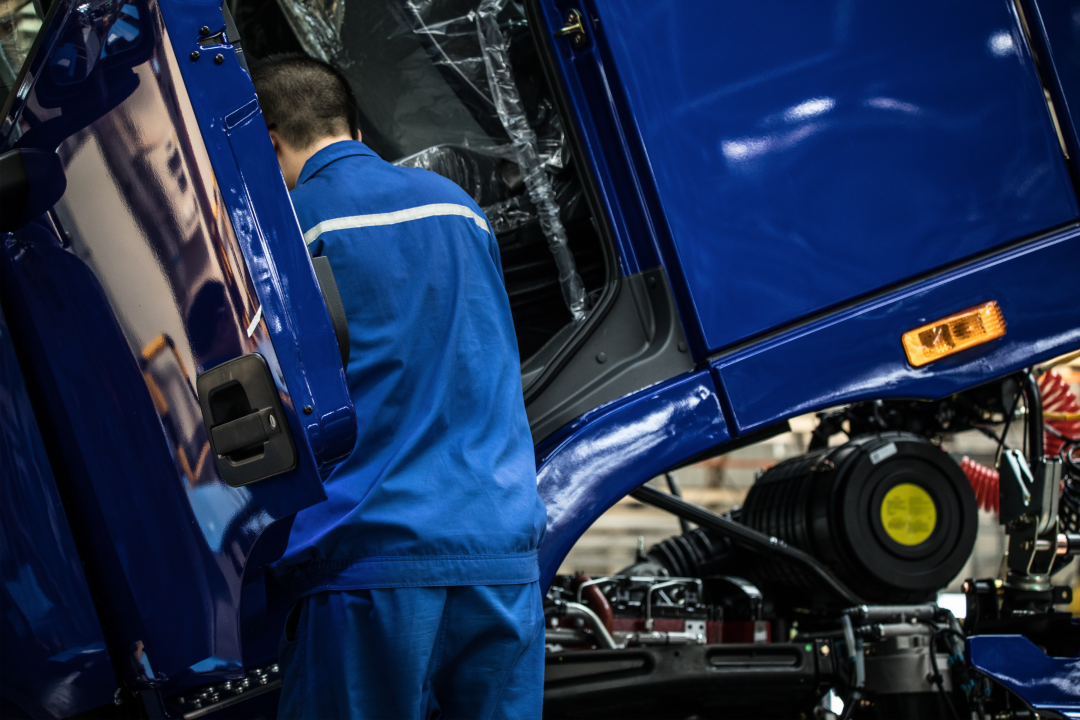
Susie Jones
Vodiči nákladných vozidiel so zdravotným postihnutím - aká podpora je k dispozícii?
Vytvorené: 12. 08. 2024
•
Aktualizované: 12. 08. 2024
V Spojenom kráľovstve 23 % obyvateľov v produktívnom veku uviedlo, že sú zdravotne postihnutí - mnohí nevedia, že veľkú časť tvoria vodiči kamiónov, ktorí nekonečne dlho cestujú po Európe, aby vám doručili tovar. Napriek tomu, že čelia mnohým výzvam, ich prítomnosť v komunite autodopravcov poukazuje na dôležitosť inklúzie a rozmanitosti v tomto odvetví.
Ak mám zdravotné postihnutie, môžem viesť nákladné vozidlo?
Ak máte telesné alebo kognitívne postihnutie, môžete viesť ťažké nákladné vozidlo. Musíte však absolvovať lekársku prehliadku, ktorá určí, či ste dostatočne schopný. Lekárska prehliadka pozostáva z nasledujúcich bodov:
Diskusia s lekárom o vašom zdraví: Vodiči musia byť úprimní a otvorení.
Lekárske vyšetrenie, pri ktorom lekár skontroluje:
Krvný tlak
Srdce
Vízia
Test na cukrovku
Neurologické ochorenia
Poruchy spánku.
Po dokončení DVLA rozhodne, či môžete viesť vozidlo.
Úpravy nákladných vozidiel
Pre vodičov s telesným postihnutím sú k dispozícii tieto úpravy:
Ručné ovládanie, ktoré nahradí pedále
Pomôcky na riadenie
Akcelerátory ľavej nohy
Premena spojky
Postroje
Špecializované sedadlá
Zariadenie na odkladanie invalidných vozíkov.
V roku 2021 výrobca nákladných vozidiel MAN upravil štyri nákladné vozidlá pre zdravotne postihnutých vodičov. Úpravy zahŕňali vybavenie nákladných vozidiel zdvíhacou plošinou pre používateľov invalidných vozíkov, aby sa mohli ľahko dostať do kabíny - so všetkými ovládacími prvkami umiestnenými na volante alebo v jeho okolí.
Aj keď sa technológie a úpravy v tomto odvetví vyvíjajú, mnohí zdravotne postihnutí vodiči stále čelia problémom pri práci.

Akým prekážkam čelia zdravotne postihnutí vodiči nákladných vozidiel?
Pre zdravotne postihnutých vodičov môže byť ťažké získať zamestnanie v tomto odvetví, aj keď majú požadovanú kvalifikáciu a absolvovali zdravotnú prehliadku. Mnohé spoločnosti sa zdráhajú poskytnúť upravené vozidlo, pretože môže ísť o nákladnú investíciu.
Andy, výkonný riaditeľ charitatívnej organizácie Globe Truckers UK, uvádza, že pre vodičov, ktorí sú ochotní zaplatiť si potrebné úpravy, je stále náročné nájsť si zamestnanie.
"Niektoré dopravné spoločnosti sa zdráhajú zamestnávať ľudí so zdravotným postihnutím - často sa obávajú prekážok, ktorým musia vodiči čeliť mimo kabíny, napríklad schodov a zdvíhania."
David Chambers, zdravotne postihnutý vodič nákladného vozidla, sa vyjadril proti skúškam, ktorým denne čelí, a vyzval na primerané úpravy zákona o rovnosti - najmä po tom, čo vláda vyzvala viac ľudí s dávkami pre zdravotne postihnutých, aby sa vrátili do práce.
David a mnohí ďalší to majú ťažké vo veľkých depách, kde podľa zákona o rovnosti nie je depo povinné vykonať primerané úpravy pre vodičov so zdravotným postihnutím. Z bezpečnostných dôvodov musia počas vykládky čakať mimo svojich nákladných vozidiel, čo vedie k prekonávaniu dlhých vzdialeností a zdolávaniu schodov.
Aká je podpora pre zdravotne postihnutých vodičov nákladných vozidiel?
Nájsť podporu môže byť pre ľudí s poraneniami alebo chorobami, ktoré menia život, náročné. Britská charitatívna organizácia Globe Truckers bola cielene vytvorená vodičmi na pomoc vodičom - poskytuje podporu zraneným, chorým alebo postihnutým.
"Mnohí zdravotne postihnutí alebo zranení vodiči nevedia, kam sa obrátiť, pretože je pre nich veľmi málo informácií. Práve tu prichádzame my a ponúkame im podporu a poradenstvo - či už ide o nasmerovanie na správnych ľudí alebo poskytnutie finančných prostriedkov na vybavenie."
"Niektorí vodiči sa jednoducho potrebujú s niekým porozprávať a my sme tu, aby sme im túto podporu poskytli akýmkoľvek spôsobom. V budúcnosti by sme boli radi, keby sme mohli financovať úpravy nákladných vozidiel pre vodičov. Úpravy môžu byť veľmi nákladné a väčšina zdravotne postihnutých vodičov si ich musí hradiť z vlastného vrecka. Aby sme to dosiahli, potrebujeme viac finančných prostriedkov a podpory od ľudí z odvetvia," uvádza Andy.
Ako môže pomôcť priemysel?
Podľa Andyho je potrebné, aby sa v tomto odvetví viac zohľadňovali telesné a kognitívne postihnutie, aby sa vytvorila inkluzívnejšia a rozmanitejšia krajina, čo sa musí čoskoro zmeniť.
"Je veľmi dôležité, aby sa priemysel vrátil k svojej podpore a času, či už priamo zdravotne postihnutým vodičom alebo charitatívnym organizáciám, ako je Globe Truckers. Odvetvie nemôže očakávať, že osloví ľudí, ak neposkytne podporu menšinám."
Zastávky pre nákladné vozidlá, ktoré sú útočiskom pre mnohých vodičov, môžu pripraviť cestu poskytovaním prístupných zariadení. V roku 2022 vláda investovala 100 miliónov libier do tohto odvetvia, aby zlepšila zariadenia pri cestách a vytvorila bezpečnejšie parkoviská pre kamióny.

Vládne financovanie by mohlo zlepšiť prístupnosť obľúbených zastávok pre zdravotne postihnutých vodičov. Podstatný vplyv by mohli mať nasledujúce zmeny:
Parkovacie miesta pre invalidné vozíky: vodiči, ktorí majú problémy s nastupovaním a vystupovaním z kabíny, potrebujú viac miesta - najmä pre tých, ktorí potrebujú zdvíhacie zariadenie.
Prístupné vybavenie: prístupné reštaurácie, toalety a iné zariadenia zabezpečujú inkluzívne prostredie.
Spoločnosti prevádzkujúce vozový park môžu pomôcť pri vytváraní inkluzívnejšieho prostredia zavedením nasledujúcich opatrení:
Úprava nákladných vozidiel - umožnenie jednoduchého ovládania pre zdravotne postihnutých vodičov prostredníctvom ručných ovládačov a adaptívnych technológií.
Podpora a odborná príprava - poskytovanie kurzov na riešenie konkrétnych problémov alebo potrieb.
Inkluzívne postupy prijímania zamestnancov - nezaujatý prístup pri prijímaní zamestnancov podporuje inkluzívnu a rôznorodú kultúru.
Zabezpečenie rozmanitej a inkluzívnej kultúry je nevyhnutné na prilákanie väčšieho počtu vodičov do odvetvia nákladnej dopravy. Podpora pre osoby s telesným a kognitívnym postihnutím je v tomto odvetví prehliadaná, takže mnohí vodiči nevedia, na koho sa obrátiť. Vodiči so zdravotným postihnutím ponúkajú jedinečný pohľad a prispôsobivosť, ktoré sú v odvetví vítanou zmenou
Čo robiť, ak sa počas kariéry stanete invalidom?
Ak sa u vás objaví zdravotný stav alebo zdravotné postihnutie, ktoré podlieha oznamovacej povinnosti, musíte o tom informovať DVLA - DVLA urobí nasledujúce kroky:
Rozhodnite sa listom - niektoré okolnosti si môžu vyžadovať viac informácií.
Posúďte svoj zdravotný stav a rozhodnite o výsledku.
Ak potrebujete prispôsobiť svoje vozidlo, budete potrebovať nezávislé posúdenie vašich [úprav] (https://www.drivingmobility.org.uk/).
Ak musíte prestať šoférovať, úrad DVLA vám poskytne lekárske odôvodnenie.



